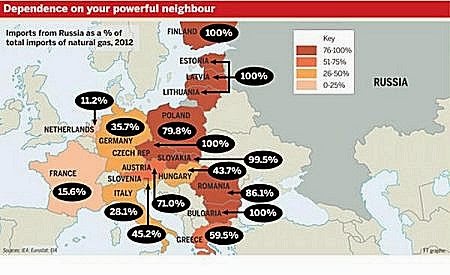- Create a law, proposed by the deputy of the United Russia faction Vladimir Ponevezhsky, to amend current legislation so that the individuals, whose property was arrested under "unjust judicial acts," could apply to the Russian court asking to be compensated for seized property.
- Create a law to seize the assets of foreign states and foreign entities (read "foreign individuals and companies")
- To receive compensation from foreign states for the seized property of Russian citizens
"Russia's Latest Retaliation Against Sanctions Puts American Multinationals In Crosshairs"
In other words, Putin is wanting to 'compensate' members of his closest clique whose assets have been confiscated under the rules of the sanctions that have been imposed upon Russia and his 'oligarch' supporters closest to him. A recent case in point of the seizure of assets by an EU country is that of Italy, where the authorities have seized 30 m Euros worth of assets from Arkady Rotenberg, a very close ally of Putin from his days in St. Petersburg.
 |
| Arkady Rotenberg |
"What is [the benefit of] a strongman's (Putin's) friendship? It's when you have 4 villas, apartments and a hotel seized in Italy and your accomplice in the Kremlin immediately introduces a bill for damages from the Russian budget."
In other words, Putin's created 'oligarch clique' want to be compensated by the Russian taxpayer from whom they stole their money in the first place.
Yet, as Hirst points out, "Given Russia's parlous economic position — GDP grew only 0.8% this year — the concept of using state funds to bail out multimillionaire businessmen may be received poorly in the country."(my emphasis)
But will the ordinary Russian taxpayers even mildly grumble about these oligarchs being compensated by the State with their money, given the fact the nearly ALL the Russian media is really the propaganda tool of Putin? Furthermore, that the latest Russian budget, " ..[has] allocated 57 percent of its spending to social causes, chiefly supporting Putin's main electorate — pensioners and state sector employees.", as reported in the Moscow Times.(Sep. 18 2014)
Are these laws proposed by Putin really to stave off dissent among the business elite, who may begin to challenge his actions against the West and against Ukraine? As John Lough points out,
"The ‘economic bloc’ in the government has found itself marginalized with decision-making left to an increasingly narrow group around Putin." (my emphasis)
 |
| John Lough. Associate Fellow, Russia and Eurasia Programme, Chatham House |
At the same time "Putin has deliberately chosen to make an example of Yevtushenkov and send a signal to keep big business on its toes. The core message is that there are new rules of the game and no one is untouchable." (John Lough) (my emphasis) One can almost hear the ghostly echo of Khodorkovsky rattling about in his prison cell.
Meanwhile, in Ukraine, the battle for Donetsk airport continues, nothwithstanding that 'ceasefire' clause of the agreed Minsk (read "Putin's") Protocol of 5th September 2014.
Is it any wonder that, " Ukrainian President Petro Poroshenko told German Chancellor Angela Merkel -- his closest and most powerful European ally -- on Monday that Russia was ignoring the terms of a September 5 peace pact the sides sealed in the Belarussian capital Minsk", as reported by Dmitry Zaks. Is this breaking of the ceasefire by Russia's proxies in eastern Ukraine Putin's ploy to undermine " the ballot for October 26 parliamentary polls once the registration deadline passes on Tuesday night (30 Sept 2014)."? (Dmitry Zaks)
Poroshenko's "highly controversial decision to promise temporary self-rule for territories under rebel control in exchange for their renouncement of independence has dominated political debate in the run-up to the parliamentary polls". (Dmitry Zaks) (my emphasis) One can only hope that he will secure a majority in the 450-seat chamber though, as Dmitry Zaks points out, "his chances of forging a coalition that could help him make peace with Russia while securing a military and economic alliance with the West at present look somewhat remote."
Meanwhile, as new evidence is emerging that Russian troops are active in eastern Ukraine, Obama and the EU are focusing their efforts on takling ISIS in the Middle East.
Moscow's plan to decoy the West
As Eglė Samoškaitė points out, "Moscow seems to be making [an] effort to patch up its relations with the West after a fall-out over Ukraine by trying to refocus attention away from Eastern Europe and onto the Middle East. Experts say, however, that the trick might not work." On the other hand, it may work. And this is the big danger for Ukraine.(to be continued)





































